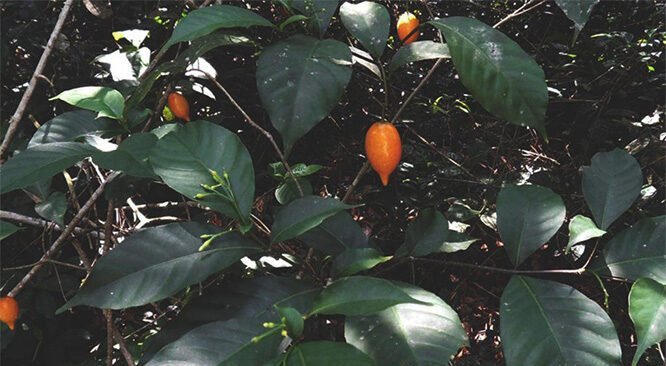This is the story of how one ancestral plant medicine native to Equatorial West Africa has slowly but surely been making its way westwards to help us heal—a shrub by the name of Tabernanthe Iboga, and its unique psychoactive alkaloid, ibogaine.
Owing to the complex tapestry of present-day society, it seems more the case with every day that we are collectively becoming more overwhelmed, disenfranchised, traumatized, and chronically depressed.
Many of us succumb to multiple addictions as damaging coping strategies for a deeper-seated pain that was already there.
In the throes of a system that favors symptom management over comprehensive and case-specific addressing of the causes of our multiple mental health ailments, it is no surprise that we have begun to look further beyond the limitations of conventional therapy.
Iboga: How the Bwiti's Ancestral Wisdom May Pave the Road for a Saner Future

Within the Bwiti spiritual tradition, numerous tribes have historically consumed the root bark of the Tabernanthe Iboga shrub, where ibogaine is most concentrated.
Although its initial discovery is credited to the Babongo people of southern Gabon, successive migrations over time would eventually spread this knowledge to neighboring communities, among which are the Mitsogho, the Punu, and the Fang tribes.
Their spiritual practice, now recognized as one of three major religions, is called “Bwiti,” and iboga as a portal to psycho-spiritual insight, emotional healing, and ancestral knowledge has been used historically (and continues to be so) in many initiation rituals and healing ceremonies.
Dr. Iboga Goes West

In a somewhat serendipitous twist of fate, French physician Theophile Griffon du Bellay first wrote about the Iboga shrub’s unique therapeutic properties in 1864.
However, its main compound, ibogaine, would not be isolated until 1901, though it took several decades for its potential to reverberate in the Western world.
In 1962, it was Howard Lotsof, himself ensnared by heroin addiction, who stumbled upon ibogaine’s astonishing capacity to banish his cravings.
Recognizing the significance of this discovery, Lotsof dedicated his life to sharing the substance with fellow addicts and advocating for ibogaine as a panacea to interrupt the chains of addiction.
Ibogaine for Addiction Treatment: A Path to Liberation

Research has illuminated ibogaine’s effectiveness in reducing drug cravings and alleviating withdrawal symptoms associated with the clutches of addiction.
Whether trauma, mental health, or addiction to opioids, cocaine, or alcohol has seized one’s life, ibogaine may offer a chance at redemption.
From what has been shown in various studies, ibogaine has the power to reset the brain’s reward pathways, disrupted by the insidious grip of addiction, and elevate levels of serotonin, the neurotransmitter linked to sensations of well-being and contentment.
As with everything, though, it is fair to acknowledge that ibogaine is not without risks and should be administered solely under the watchful eye of qualified medical professionals.
Stuck Between the Law and a Healing Place?

In the United States, where the ebb and flow of regulation often casts its shadow upon the landscape of healing, ibogaine finds itself still classified as a Schedule I substance since 1967.
This has kept the legitimate pursuit of its medicinal potential teetering on the precipice of the permitted, supposedly on account of its potential health risks.
However, amidst the concerns surrounding its potential cardiotoxicity, there lies a glimmer of hope, and it is this: should ibogaine one day be legally destigmatized, it could offer solace for those suffering from both mental health issues as well as addiction on a global scale.
As we navigate the complex tapestry of regulation and safety, it is crucial that we tread with care, seeking the guidance of experienced ibogaine clinics such as us here at Ibogaine Treatment UK (Iboga Root Sanctuary), one of Europe’s leading ibogaine treatment centers.
The Future of Ibogaine: a Beacon of Hope Amidst the Darkness

As the tide of drug overdoses surges, and not only in the US, the importance of ibogaine as a treatment option becomes ever more critical, especially because the blight of addiction does not happen in a vacuum, as renowned physician and author Gabor Maté highlights:
“The question is never ´why the addiction?´ but ´why the pain?´”
Over 200 scientific papers published since 2010 have delved into ibogaine and its potential applications for addiction treatment, for which it is mainly renowned.
However, its benefits extend well beyond the treatment of addiction disorders, and have shown proven benefits in healing from conditions such as PTSD, depression, anhedonia, and anxiety.
Unraveling the Tangled Web of the Psyche

The enigmatic nature of ibogaine has also led to investigations into its therapeutic potential concerning trauma and repressed memories, with some studies suggesting that ibogaine may facilitate the processing of harrowing experiences and memories, leading to improved mental health outcomes.
Scientifically speaking, the exact mechanisms by which ibogaine exerts its therapeutic effects on trauma and repressed memories remain elusive.
However, by presenting the information contained in the subconscious in the form of extremely vivid, lucid-dream-type visions which last the better part of twenty-four hours, it seems this is how ibogaine may aid individuals in processing traumatic experiences: by fostering communication between disparate regions of the brain.
Peace After War: Ibogaine and PTSD

PTSD, or post-traumatic stress disorder, is a mental health condition that afflicts those who have either experienced or witnessed a traumatic event.
Complex PTSD, a variation, describes those who have endured prolonged abuse and trauma, which covers war veterans or those who have suffered persistent childhood abuse, torture, physical, emotional or sexual abuse.
Conventional treatments for PTSD often entail therapy and medication but fall short because their focus is limited mainly to the management of symptoms, which renders them ill-suited to the treatment of C-PTSD.
However, ibogaine has emerged as a potential alternative therapy.
Although research on ibogaine for PTSD is still in its infancy, preliminary studies have shown encouraging results.
A study published found that ibogaine was highly effective in reducing C-PTSD symptoms in veterans, and helping them reclaim their lives from the cycles of flashbacks, hyperarousal, dissociation, depression, and addiction.
Performing a “Factory Reset” on the Brain

Beyond addiction and trauma-related conditions, ibogaine has garnered interest for its potential applications in addressing various mental health issues, such as depression, anhedonia, and anxiety.
While there are no specific clinical studies yet, our evidence from working with numerous clients at Ibogaine Treatment UK (Iboga Root Sanctuary) has revealed that ibogaine treatment has led to significant and lasting reductions in symptoms of depression, even if it is not, in and of itself, an all-out cure.
Similarly, we have also seen its potential to treat hyperarousal.
For many of our clients, as little as one single ibogaine treatment has led to significant reductions in anxiety and panic attacks for months following treatment.
From what is so far known from scientific research, one of the ways ibogaine works is by reducing activity in the amygdala, a brain region often overactive in anxiety and major depressive disorders.
The exact scientific mechanisms by which ibogaine exerts its therapeutic effects on mental health issues are not yet fully understood.
However, preliminary studies reveal that ibogaine may help by resetting neural circuits in the brain, promoting neuroplasticity, and modulating levels of neurotransmitters such as serotonin and dopamine.
How Safe is Ibogaine?

Like addiction treatment, the use of ibogaine for mental health issues is not without risks. Ibogaine’s psychoactive effects can be intense and long-lasting, potentially leading to adverse reactions.
In terms of its psychoactive effect, ibogaine mines the subconscious for repressed memories regarding an individual’s life, allowing them to re-live and re-interpret key events that may have molded their subconscious idea of themselves.
This aspect alone can make it a challenging journey and is the main reason why we at Ibogaine Treatment UK (Iboga Root Sanctuary) insist on having certified in-house therapists.
Additionally, ibogaine also poses some health risks in terms of cardiac, respiratory, and liver function.
Because we insist on covering all bases when it comes to client safety, prior to admission we demand a full blood panel test, along with liver function, resting, and stress ECG tests.
For each person undergoing treatment, we have a fully trained ACLS medical team of a head doctor and nurses and are equipped with state-of-the-art ECG machines and defibrillators.
Despite the challenges and risks associated with ibogaine, the potential benefits cannot be ignored.
This increasing interest in the therapeutic use of entheogens such as ibogaine, along with the growing need for more effective treatments for mental health issues, means that the potential of ibogaine will continue to be explored.
Migraine, Anyone? Welcome to The Age of Overwhelm

That the world, and human civilizations with it, have cyclically treaded a fine line between prosperity and annihilation is no secret.
However, it has become an unassailable fact that we, as a collective race, have never before treaded a socio-cultural landscape as atomized and confusing as the times in which we currently live.
Now, more than ever, it is clear we live in an age which French philosopher and social theorist Jean Baudrillard once referred to as “the pornography of the visible.”
An age of hyperreality, where what is real has been replaced by its simulation; where signs, symbols, and images have become more tangible than that which they represent.
Muddled by the overwhelming display, across many media platforms, of images and signs—a complete saturation of the visual sphere—we, as a race of supposedly cognizant mammals, have sadly settled for the glossy surface of things rather than their substance.
Paradise Lost: Christianity vs. Spiritual Pluralism

From the cradle of healthy religious pluralism, Christianity was born—the belief in one uncontested and male God—which, over time, would not only challenge but essentially stamp out the previous 2.6 million years in which Homo Sapiens believed that all things and creatures were equal, had a soul and communicated with one another.
This direct channel of communication with the divine which all humans had enjoyed since time immemorial, as well as the ancestral wisdom we once respectfully harvested from our communion with nature, were all but eradicated by the discoveries and conquistadors when they colonized the Americas, where native tribes had forever made use of ancestral plant medicines such as ayahuasca and psilocybin mushrooms for psycho-spiritual insight and communal healing.
Sadly, the same was to occur with the Portuguese, Spanish, and Dutch colonization of Africa.
As the insidious spread of patriarchal dominance would have it, the Catholic Church, as an institution, dealt with those it considered “infidels” in the most brutal of ways, flexing its genocidal jaws far and wide.
Especially damaging to clerical elites was the idea that every person might be able to communicate with the divine.
The inherent risk of such knowledge, should it spread to European civilization, might lessen their power as sole and uncontested intermediaries between mankind and God.
A Metaphor for Modern Times

An apt metaphor for this is to be found in the first film of “The Lord of the Rings” trilogy, in Galadriel’s opening monologue:
“The world has changed. I feel it in the water. I feel it in the earth. I smell it in the air. Much that once was is lost, for none who now live remember it. […] And some things, that should not have been forgotten, were lost. History became legend, legend became myth, and for two and a half thousand years, the ring passed out of all knowledge.”
Though it has only been 531 years since Christopher Columbus’ first voyage to the Americas in 1492, and although we are not talking about Lord Sauron’s demonic “ring of power,” but about the benign and ancestral wisdom of plant medicines, the metaphor could not be a better fit.
That wisdom, until recently, was what had “passed out of knowledge.”
Paving the Road for a Better Future: Looking to the Past to Heal the Present

“Disconnection” is the operative word here. From healing. From knowledge. From diversity. From truth.
And in disconnecting ever more from the wisdom of planet Earth and of our ancestors, we have done ourselves great disservice.
And if we assume that Tolkien’s “ring of power” holds, in equal parts, as much promise as it does risk, then we can apply that metaphor neatly to a single shrub native to equatorial West Africa—Tabernanthe Iboga.
And why, you may ask?
Because despite potentially adverse effects, its powerful psychoactive alkaloid, ibogaine, has an innate tendency to always break through the glossy surface of things and go straight for their substance.
In this, it remains unparalleled in both nature and science as Ultimate Healer for such modern-day maladies as chronic anxiety, addiction, depression, anhedonia, and trauma.
That said, it is important to remember: ibogaine, in and of itself is not, and never will be a cure-all.
If we as individuals are not willing to do “the work” ourselves, to work with our subconscious, learn from it, and make key changes to coping mechanisms that no longer serve us, then no matter how many doors such ancestral medicines may open, we shall forever loom on the threshold of significant change.

